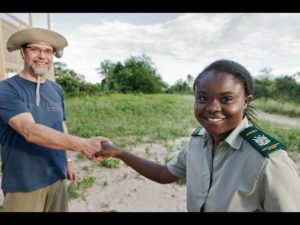First female Namibian national park manager pursues studies at CSU
by CSU MarComm Staff | May 5, 2016 1:05 PM
By Wesley White, Departement of Human Dimensions of Natural Resources
Far to the north of the Namibian Skeleton Coast and the sweeping Namib Desert, near the southern tip of the African continent, lies the Oshana region. “Oshana” refers to shallow, seasonally inundated depressions on the high savanna plains that support the herding livelihoods of inhabitants like Monika Shikongo and her family.
Despite Namibia’s arid landscapes, its biodiversity rivals regions with greater annual precipitation. In this seasonal landscape a young Shikongo came to treasure the environments of her native land and, later, to become the first woman to manage a Namibian national park. She is now a graduate student at Colorado State University in the Conservation Leadership through Learning[1] program.
Land of scarcity and plenty

Shikongo managed Bwabwata National Park[2] in Northeastern Namibia. The park is unusual because it is crosses the boundaries of four nations: Angola, Botswana, Namibia, and Zambia. It is also an important migration route for elephant and other game species. For Shikongo, managing this unique and dynamic situation meant becoming adept at working collaboratively with diverse groups and cultures to solve complex conservation issues.
“All of the country depends” on this park, said Shikongo. “Animals need to pass through, you’ve got people living inside the park but also others who depend on this park for their livelihood. And you’ve got conservation as well.”
As part of her job, Shikongo has led crews of armed anti-poaching units. “From time to time, we have to fight poachers,” she said. “You have to stay up at night, trying to protect the wildlife.”
“This is what I need, this is my future”
Shikongo came to CSU to study conservation leadership. “I wanted to find a program to complement my experience, as well as enhance and add new skills,” she explained.
“I was introduced to leadership at a young age managing a park, but [thought] maybe I’m missing something related to my leadership skills. I thought, ‘this is what I need, this is my future,’” Shikongo added.
Great leadership often means having the courage to assert your skills and knowledge but also a self-awareness of personal growth opportunities. Shikongo has shown this during her time in the CLTL program.
“Monika came to the program open to learning and has grown throughout her time at CSU. Her leadership abilities have been honed by years of ‘boots on the ground’ conservation experience,” said Assistant Professor Jennifer Solomon, who studies global conservation practices and policies. “Monika Shikongo is someone to watch. She is bound to make an enormous impact in conservation.”
Her colleagues in the program are equally impressed. “Monika has proven her abilities of working in complex situations,” fellow CLTL student Alex McHenry said. “She sees the big picture, but also breaks down situations into manageable steps. She does not oversimplify or deny complexity.”
Women in conservation leadership
Shikongo is the first woman ever in command of a national park in Namibia. This is indicative of much of the conservation leadership landscape across the globe according to Solomon, who studies global conservation practices and policies.
“Women are underrepresented in senior leadership positions in conservation posts such as the ones Monika has held,” she said. “Having effective women in leadership roles is important for the future of conservation. Not only does Monika provide people with a positive female role model, but the participation of women such as Monika in national-level decision making can improve conservation outcomes.”
Shikongo has earned the respect of her fellow rangers through her dedication to the park, leadership, and commitment to conservation.
“Monika is very self-motivated and she has courage and energy for conservation,” said Michael Sibalatani, chief control warden, Ministry of Environment and Tourism in Namibia. “She is a leader who successfully managed and led a big park… and led by good example [of] self discipline and economical asset management.”
Shikongo is currently a finalist for the prestigious World Wildlife Federation Presidential Award. She was nominated by the WWF Regional Office of Africa, which cited her leadership, mentorship of other female conservationists, and her commitment to collaborative conservation, involving Namibian stakeholders, regulators, and rangers.
The award-winning Conservation Leadership through Learning program was developed by the Department of Human Dimensions of Natural Resources[3] in the Warner College of Natural Resources. The program trains conservationists like Shikongo to address global environmental challenges.
- Conservation Leadership through Learning: http://warnercnr.colostate.edu/cltl-home
- Bwabwata National Park: http://www.namibian.org/travel/namibia/bwabwata.html
- Department of Human Dimensions of Natural Resources: http://warnercnr.colostate.edu/hdnr-home
Source URL: https://source.colostate.edu/first-female-namibian-national-park-manager-pursues-studies-at-csu/
Copyright ©2024 SOURCE unless otherwise noted.